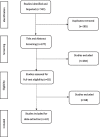Exploring the factors that affect the transition from student to health professional: an Integrative review
- PMID: 34727905
- PMCID: PMC8561904
- DOI: 10.1186/s12909-021-02978-0
Exploring the factors that affect the transition from student to health professional: an Integrative review
Abstract
Background: The nature of a new health professional's transition from student to health professional is a significant determinant of the ease or difficulty of the journey to professional competence. The integrative review will explore the extent of literature on the factors that impact the transition of new health professionals into practice, identify possible gaps and synthesise findings which will inform further research. The aim was to identify research conducted in the last two decades on the barriers, facilitators and coping strategies employed by new health professionals during their transition into practice.
Methods: Whittemore and Knafl's methodological framework for conducting integrative reviews was used to guide this review. Sources between 1999 and 2019 were gathered using EBSCOhost (including CINAHL, Medline, Academic Search Premier, Health Science: Nursing and Academic Edition), PubMed, Scopus, Cochrane and Web of Science, as well as hand searching and follow-up of bibliographies followed. The Covidence platform was used to manage the project. All studies were screened against a predetermined selection criteria. Relevant data was extracted from included sources and analysed using thematic analysis approach.
Results: Of the 562 studies identified, relevant data was extracted from 24 studies that met the inclusion criteria, and analysed to form this review. Thematic analysis approach was used to categorise the findings into theme areas. Four overarching themes emerged namely: systems and structures, personal capacities, professional competence and mediating processes. Each theme revealed the barriers, facilitators and coping strategies of transition into practice among new health graduates.
Conclusion: The transition into practice for new health practitioners has been described as complex and a period of great stress. Increasing clinical and practical experiences during education are required to support new health professionals in the process of closing the gap between learning and practice. Continued professional development activities should be readily available and attendance of these encouraged.
Keywords: Clinical practice; New clinicians; Novice professionals; Professional competence; Professional practice; Role transition; Systematic literature review.
© 2021. The Author(s).
Conflict of interest statement
The authors declare that they have no competing interests.
Figures
References
-
- Naidoo D, Wyk J, Van Joubert RN. Are final year occupational therapy students adequately prepared for clinical practice? A case study in KwaZulu-Natal. South African J Occup Ther. 2014;44(3):24–8.
-
- Morley M, Rugg S, Drew J. Before preceptorship: new occupational therapists’ expectations of practice and experience of supervision. Br J Occup Ther. 2007;70(6):243–253. doi: 10.1177/030802260707000604. - DOI
-
- Labrague L, McEnroe-Petite D, Leocadio M. Transition experiences of newly graduated Filipino nurses in a resource - scarce rural health care setting: a qualitative study. Nurs Forum. 2019;54(2):298–306. - PubMed
-
- Clare J, Van Loon A. Best practice principles for the transition from student to registered nurse. Collegian. 2003;10(4):25–31.
Publication types
MeSH terms
LinkOut - more resources
Full Text Sources
Miscellaneous




